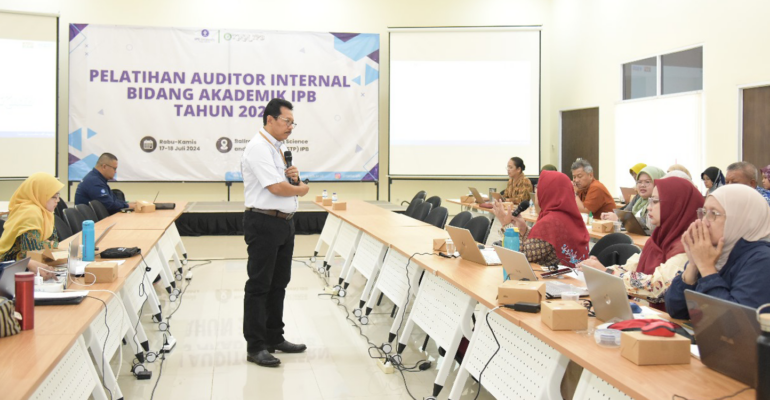IPB University Quality Management Office Trains Dozens of Academic Internal Auditors in Campus Environment

IPB University’s Quality Management Office trained dozens of academic internal auditors in the campus environment. The training for internal auditors was held for two days (17-18/6) in the Ballroom of Science and Techno Park (STP) Building, IPB Taman Kencana Campus, Bogor.
In his speech, Secretary of IPB University, Prof Agus Purwito conveyed the importance of internal audit in the academic field of higher education, because it is the basis of an accreditation process.
“As time goes by, internal auditors in the academic field are retiring, transferring duties and being replaced with new ones, so it is important to refresh with training,” he said.
In addition, Prof Agus said that academic internal audits in study programmes are needed for the accreditation process. Currently, many study programmes are upgrading the Conversion Supplement Instrument (ISK), so it requires internal academic audit data from each faculty. Thus, when needed, there are documents used for accreditation activities.
As a public body, he continued, IPB University must get an audit from an external audit office. The existence of an internal audit is an effort to prepare for an external audit.
“We all get an audit, IPB University also gets an audit from an external public accounting firm, also gets an audit from the Financial Supervisory Agency (BPK), as well as the Inspectorate General of the Ministry of Education, Culture, Research and Technology.”
“As an educational institution, IPB University will be audited as far as learning goes, whether it is in accordance with the standards, whether the process of conducting learning is correct, also how is the quality of research, what percentage of compliance with standards has been met, which areas must be improved, what about resources, teaching staff, facilities, what needs to be done to our study programmes, so that all are transparent and can be accounted for,” he explained.
Chief of IPB University’s Quality Management Office, Dr I Wayan Nurjaya said that this training was closely related to the demands of the Automation Instrument of the Minister of Education, Culture, Research and Technology Regulation (Permendikbudristek) No 53 of 2023. Thus, internal quality assurance standards are one thing that must be strong, he said.
“When the Automation Instrument of Permendikbudristek No 53 Year 2023 is enacted, then all documents will be viewed online, so it needs a lot of internal auditors,” said Dr Wayan Nurjaya.
He further said that IPB University has more than 166 study programmes that must continue to be guarded in their internal audit reports. Therefore, if the internal audit report goes well, then the assessment from the external auditor will certainly be good too. Conversely, if there are things that do not meet the standards, they should be resolved quickly.
In addition, he hopes that each study programme will conduct internal audits simultaneously. “Thankfully, there are currently three faculties that have conducted internal audits simultaneously,” he added.
In his explanation of IPB University’s internal quality management policy, Dr Wayan mentioned that as of 16 July 2024, 42.7 per cent of study programmes were accredited as excellent and 32 per cent as A accredited. For study programmes that have been accredited A, he hopes that they will soon be upgraded to superior accreditation. (IAAS/RUM)



